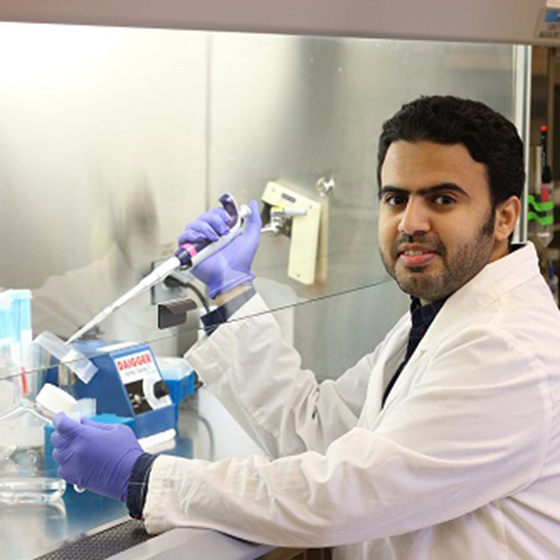Dedicated to Microbiology—With a Master’s Degree from Hood

Graduate student Fawaz Mohammed Almufarriji has been conducting research in antibiotics-resistant bacteria.
Fawaz Mohammed Almufarriji
Program
- Biomedical Science (M.S.)
Department
- Biology
Fawaz Mohammed Almufarriji, Biomedical Science M.S. candidate, has been working as a full-time research assistant on a volunteer basis in Dr. Michael Otto’s lab, in the Laboratory of Bacteriology (LB) at the National Institute of Allergy and Infectious Diseases (NIAID) in the National Institute of health (NIH). He is particularly conducting research in antibiotics resistant bacterium Methicillin-resistant Staphylococcus aureus (MRSA).
Fawaz says, “In August 2014, I began to work toward my master’s in the Biomedical Science program at Hood College, where I took advantage of the highly qualified full-time faculty, and benefited from the knowledge and expertise of adjunct professors who are leaders in the laboratories of the National Cancer Institute’s Frederick Cancer Research Facility, the U.S. Army Research Institute on Infectious Diseases, the U.S. Department of Agriculture, and other neighboring biomedical and biotechnology facilities. Being a student in a program adjacent to such facilities provides me with a broad knowledge of the current research in multiple areas, from cancer to antibiotic-resistant bacteria. In addition, the program provides me with extensive lab skills and scientific knowledge in molecular biology and genetics. After two years of searching and overcoming immigration regulation obstacles, I independently arranged to work in one of the best biomedical research centers in the world where I started working in Dr. Michael Otto’s lab, LB/NIAID/NIH, as his research assistant for nearly a year."
While working in Dr. Otto’s lab, Fawaz was writing a mock grant proposal in which he intended to silence the expression of some essential genes in MRSA using Peptide Nucleic Acid (PNA) as an antisense. The proposal’s ultimate goal is to identify essential genes in MRSA that can be inhibited with a minimum inhibitory effect of PNAs and minimum off-target effect. This novel therapy not only can eradicate MRSA but maybe all antibiotics resistant bacteria.
What are Fawaz’s goals? “My short-term goal is to conduct doctoral research in fighting antibiotics-resistant Staphylococcus aureus. My long-term goal is to teach at the university level and conduct research in the field of antimicrobial-resistant bacteria, especially in finding a therapy that is an alternative to antibiotics and eradicating the infections caused by antibiotic-resistant bacteria in Saudi Arabia.”
After earning a scholarship to Shaqra University in Saudi Arabia where he worked as a teacher assistant since 2011, Fawaz came to Hood for his master’s, which he will complete in January, 2017.He looks forward to his doctoral studies at the University of Leeds.
Fawaz is a member of the American Society of Microbiology (ASM) and has built a coalition of scientific collaborators from around the world, who are interested in fighting MRSA. His continued studies in the School of Molecular and Cellular Biology at Leeds will enable him to reach both his short and long term goals.
Are you ready to say Hello?
Choose a Pathway
Information will vary based on program level. Select a path to find the information you're looking for!
